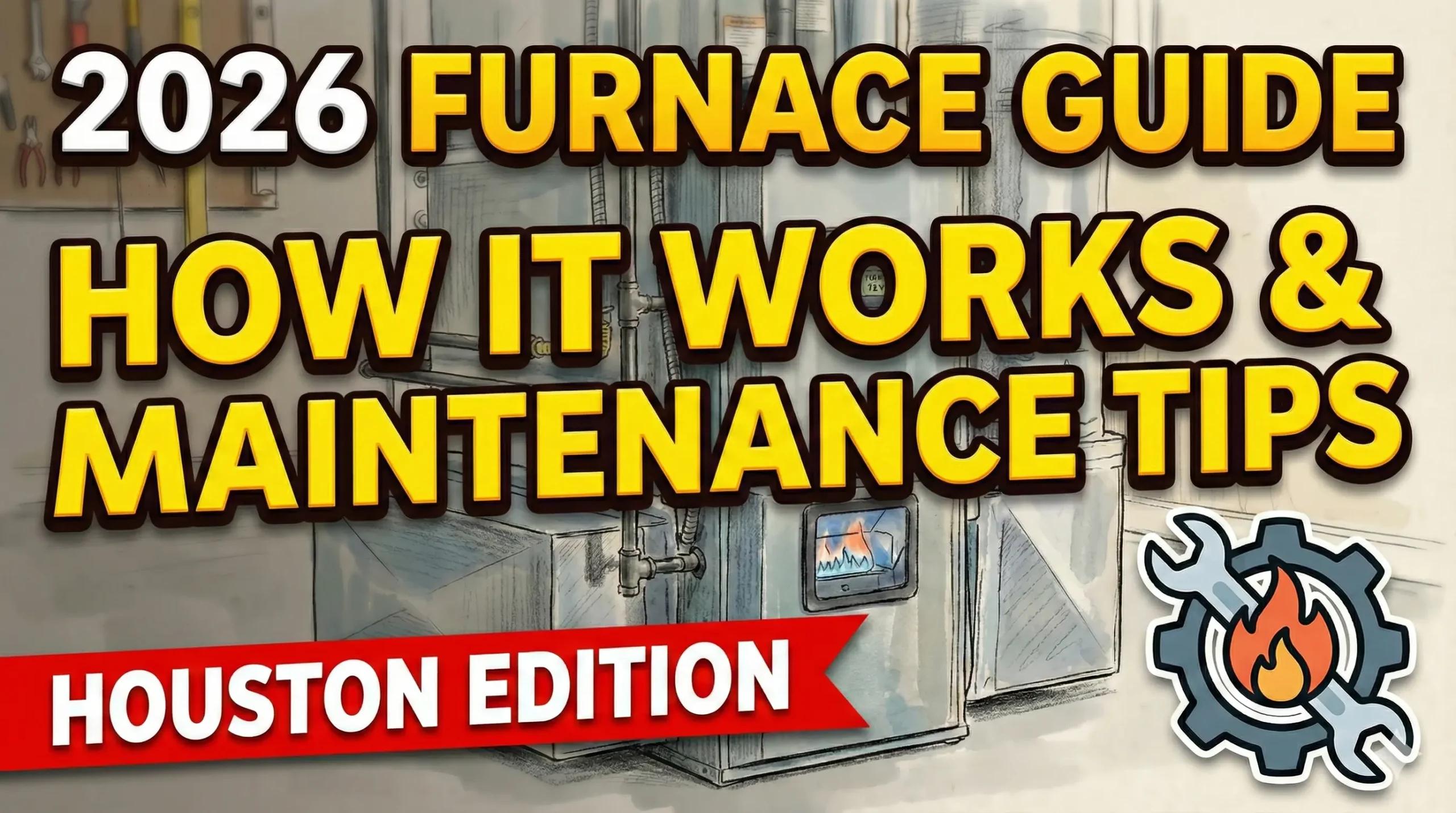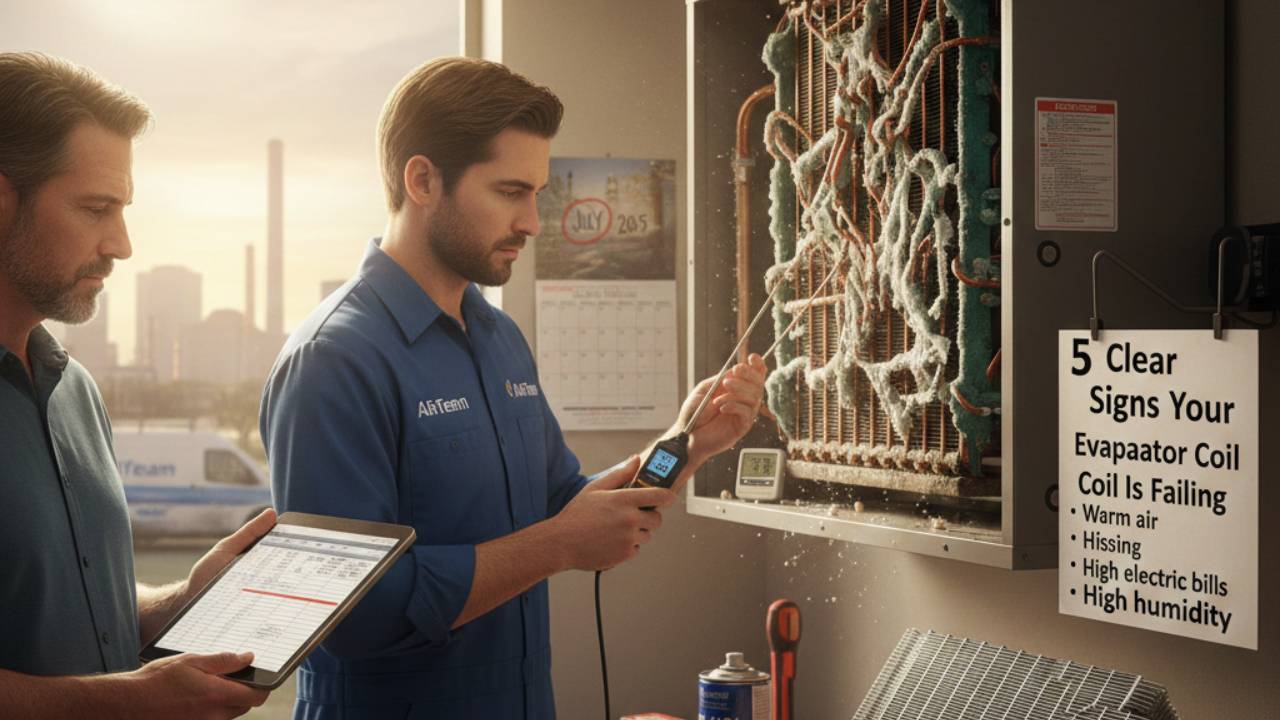Depending on how long you’ve been following our blog, you may have noticed that we get a bunch of questions regarding HVAC maintenance. That’s no surprise given we are based in Houston, TX—one of the most brutal climate zones for AC units.
The warm climate coupled with the overkill humidity, make it a miserable place to live if your AC goes out on you in July. However, with proper maintenance and knowing the signs of trouble, you can greatly reduce the odds of catastrophic failures.
With summer finally on its way out, it’s going to be a great time to get an HVAC system checkup from the best in Houston AC Repair.
But when is it time to get an AC checkup? What signs does a unit show when it’s in trouble? How do you know when it’s time to buy a new unit?
Well, sit tight—this is the blog post for you. We’ve compiled some of our most frequently asked questions from all of our clients and give you quick, concise answers. Knowing the answers to these burning questions could save you thousands.
What Size AC Unit Do I Need For My Home?
Buying the right size air conditioning unit for your Houston home is solved easily by a simple, scientific formula. Our installer will need to perform a load calculation on your home.
This calculation is based on a proven formula that calculates the exact size unit to cool and heat your home efficiently. Most might be tempted to think it’s as easy as buying the bigger, more expensive unit. However, that is not the case. Your home size isn’t the only factor when it comes to getting the right size unit.
In fact, aside from square footage, there are several other equally important factors to consider. For starters, you’ll need to follow a simple mathematical formula to get the load calculation of your home. Ah, but it might be helpful if we explain
A load calculation is a simple number that indicates how much cooling and heating power is needed to keep you comfortable. Getting that number, however, is not that simple. For example, HVAC system requirements are going to be different by region. What you need in hot and humid Houston will be different than cold and rainy Seattle.
Believe it or not, while everyone knows you can buy a system that is too small for your home, you can also buy one too large. Yes, you read that right, bigger is not always better in the case of HVAC efficiency.
The best way to get your load calculation is to join our MVP planned service program. This routine maintenance program helps keep your system in top shape. Additionally, it can help you identify minor problems before they turn into major catastrophes.
How Old Is “Too Old” For An AC Unit?
Investing in a high-quality, energy-efficient Houston HVAC system is a serious financial decision. So, it’s not something you just casually jump into. You need to evaluate the situation and find out if a new unit is really what you need.
Sometimes a failing air conditioner is simply the symptom of a minor component breakdown. Other times, it could be a sign of a catastrophic failure.
Either way, having to make that call is not an easy decision but you should take into account some important factors. Some of these are common sense and others are a bit more overlooked.
Age Of Your Unit
With Houston HVAC units, even the most advanced model has a typical lifespan of up to 15 years. Now, if you maintain it well it might last you even longer. However, some systems at that milestone may still work—just not as efficient as they once did.
Is your system over 10 years old? Has your warranty already expired? Are you experiencing frequent problems with your unit? Have the estimates to repair it been expensive? If you answered yes to these questions—a new system may be the smart move.
However, if it’s less than 10 years old and still under warranty—replacing it doesn’t make sense. This is especially true if you’ve maintained the unit well and kept up on all scheduled services. Unless you are experiencing a major failure, repairing is likely the better choice.
If the failing component costs over $5,000 to repair—you’re better off, in the long run, getting a new unit. If the problem has gone untreated for a while it’s even more of a reason to buy new. You never know the kind of wear and tear other parts of your unit have experienced due to the component in question.
Why Is My Unit Freezing Up?
There are many possible causes for a unit freezing on you. However, the most common that we encounter is a system that is leaking refrigerant.
When the refrigerant is leaking, it’s usually a pinhole leak and so it might not always present itself as the obvious culprit. However, the unit will begin to run for extended periods rather than cycling off as it should.
When this happens the coils inside that remove the heat from the air in your home get extremely cold. Then, they eventually freeze up and gather a layer of ice around them rendering the coil useless.
Just because that’s the most common culprit, doesn’t mean it’s the only reason. Another common reason is airflow issues and usually, that’s due to dirty filters. When there’s restricted airflow, the air can’t rotate through the system. That also causes the coils to freeze and then you’re back to square one.
These two main issues in and of themselves lead to another problem—condensate leak. We’re not talking about a leak that happens where condensate might normally drip. We’re talking in your attic—where water exposure doesn’t normally occur.
Now, you’re looking at water damage, mildew & mold issues and if left untreated, wood rot. So, you can see why it’s so important to call us when you notice your system performing even slightly out of the norm.
When Should I Expect To Have To Replace My Furnace?
Furnaces tend to last a bit less than condenser units due to the extreme temperatures they endure to heat your home. Typically, most customers will begin to notice a dropoff in performance or major issues at about 12 years in.
Usually, the failures are on the major components such as the control board or blower motor. These components have to endure a lot in their lifetime. Power surges, electrical storms, and other environmental hazards.
When you’re looking at these major repairs, it’s a good time to consider just replacing the furnace. Usually, you can even replace it with something far more efficient. That will also offset the cost in energy savings.
The longer you hold on to your furnace past its typical life expectancy, the more it will cost you to hold on to it. You’re just throwing away money after that with each major failure repair.
One thing you can do to extend the life of your furnace as long as possible is to get routine maintenance on it. Our MVP preventative maintenance program is an effortless and affordable way to make sure your furnace stays in top form.
Did We Miss Your Houston AC Repair Question?
We will continue to cover our most frequently asked questions from our customers in future blogs. However, if you need help with anything regarding your HVAC and you didn’t find the answer here, please contact us!
We’re always happy to help with questions about HVAC or to give you a quote on a new installation—we’re only a click or call away!




